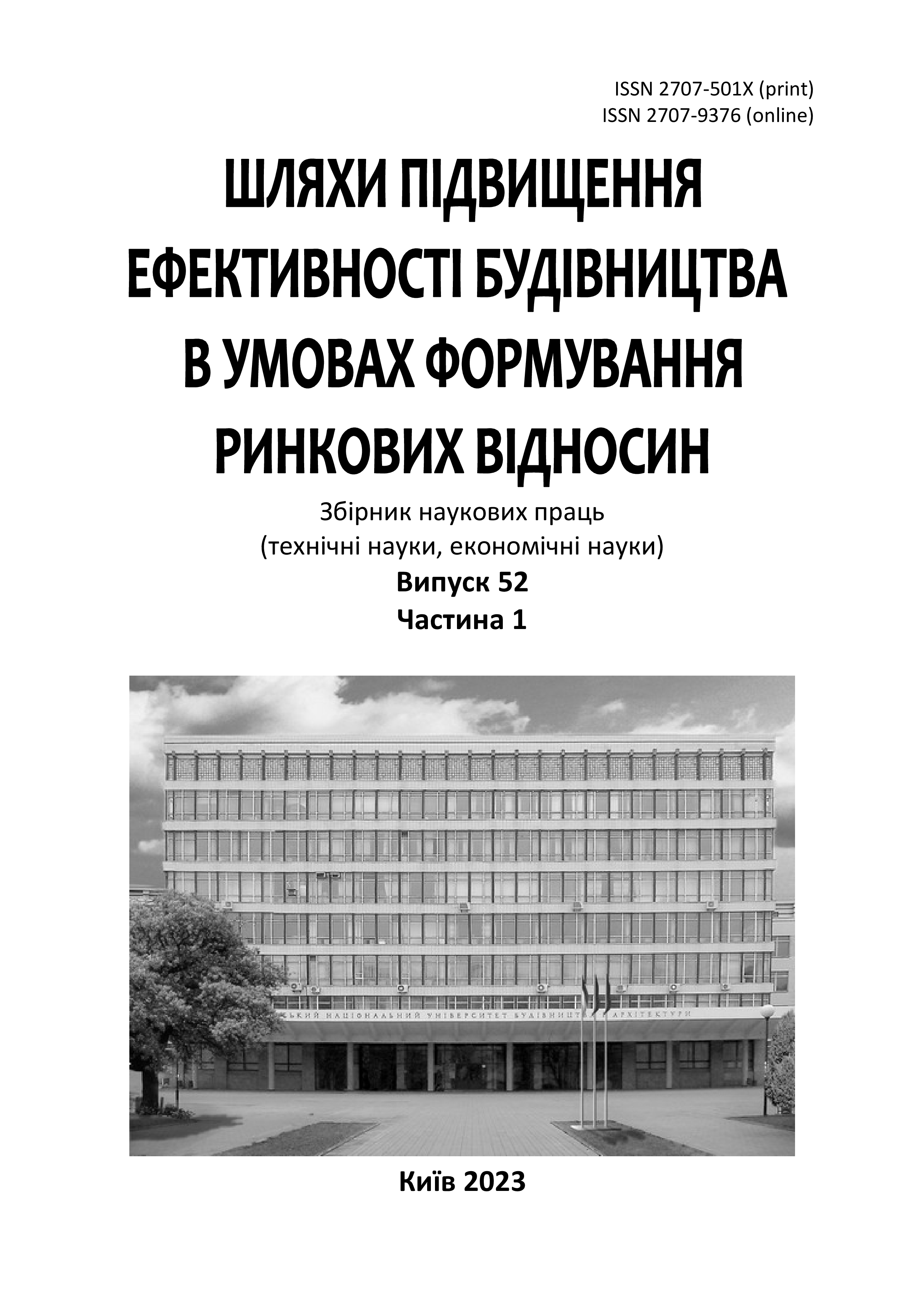Organization of the integrated management system in the construction industry
DOI:
https://doi.org/10.32347/2707-501x.2023.52(1).138-146Keywords:
organization, construction, integrated management, processes, resources, prospectsAbstract
The scientific article reveals the problems of finding innovative approaches to solving problems related to the organization of an integrated management system in the construction industry. Promising trends of integrated management in the construction sector, which are focused on the flexibility and adaptability of management systems to modern conditions, are studied. The ability to respond quickly to changes in market conditions and customer requirements is becoming key to the success of construction projects. The urgency of the problem of finding rational solutions for the organization of the integrated management system in the construction industry is indicated. The paper highlights the problems of organization of the integrated management system in the construction hall. Construction projects often come with risks, such as changes in the project, unforeseen circumstances, and technical complications. Integrated management systems must meet the challenges of risk management and provide flexibility in solving problems. Grounded prospects and opportunities for using an integrated management system that allows construction enterprises to be flexible and adaptable to changes in the internal and external environment. This is especially important in the face of rapid technological changes and volatile market conditions. As a result of the analysis, opportunities for the introduction of innovative technologies and methods in the construction industry have been identified. The integration of advanced solutions allows us to improve construction processes at all stages. The results of our research revealed the basic principles of applying an integrated management model under risk conditions for quality control modules in construction, based on the concept of dynamic systems. Therefore, we consider it expedient to introduce an integrated model risk and quality management in construction, and this requires further scientific research. The proposed method allows to harmonize the processes of quality management and risk management, taking into account the criteria of project efficiency, contributing to the avoidance of conflicts between the requirements for the quality of the construction object and the level of acceptable risks. In addition, this approach aligns them with the efficiency requirements for the developer. It is determined that the principles of using the integrated model of quality management in the face of risks include the principle of complementarity and the principle of identity of the management process. This made it possible to identify management modules that correspond to the concept of construction quality management in the face of risks as a dynamic system.
References
Анін В.І., Ічетовкін А.О. Механізм вибору організаційно-технологічних рішень на підґрунті інтегрованого управління будівельними процесами. Металознавство та термічна обробка металів. 2021. №2 (93). С. 7-14. DOI: 10.30838/J.PMHTM.2413.270421.7.736
Бондар О. А., Поколенко В. О., Пилипчук О. Д., Халілов А. Аналітичний базис діяльності підрядного підприємства в сучасному цифровому середовищі. Шляхи підвищення ефективності будівництва в умовах формування ринкових відносин. 2021. Вип. 47, т. 1. С. 87–95. DOI:10.32347/2707-501x.2021.47(1).87-95
Гоц В.В. Інтегроване управління інформаційним середовищем девелоперських проектів: автореф. дис. ... к-та техн. наук: 05.13.22. Київ: КНУБА, 2014. 25 с.
Закон України «Про внесення змін до Закону України «Про будівельні норми» щодо удосконалення нормування у будівництві» [чинний від 2019-19-10]. URL: https://zakon.rada.gov.ua/laws/show/156-20#Text (дата звернення: 10.04.2021)
Заяць Є.І. Розвиток методів оцінки, обґрунтування та вибору раціональних організаційно-технологічних рішень зведення висотних багатофункціональних комплексів. Вісник Придніпровської державної академії будівництва та архітектури. 2015. № 6 (207). С. 37−44. URL: http://srd.pgasa.dp.ua:8080/bitstream/123456789/6367/1/Zaiats.pdf.
Ісаєнко Д. Методологічні принципи формування системи технічного регулювання у будівництві. Нові технології в будівництві. 2018. № 35. С. 17−20. DOI: 10.32782/2664-0406.2018.35.3
Ічетовкін A.A. Методика оцінки параметрів у механізмі вибору організаційно-технологічних рішень. Наука та прогрес транспорту. Вісник Дніпропетровського національного університету залізничного транспорту, 2021, №2 (92). С. 76-83. DOI: 10.15802/stp2021/229848
Рижаков Д. Визначення особливостей системоутвірних факторів ціннісно-орієнтованого менеджменту в проектах будівництва. Управління розвитком складних систем. 2020. № 43. С. 182−191. DOI: 10.32347/2412-9933.2020.43.182-19
Чернишев Д.О. та ін. Методичне підгрунття та адміністративно-управлінські засади вдосконалення операційно-виробничої системи та організаційної структури девелоперської компанії. Шляхи підвищення ефективності будівництва в умовах формування ринкових відносин, 2019. Вип. 39, т. 2. С. 34–43. DOI: 10.32347/2707-501x.2019.39.34-43.
Arutiunian I. A., Dankevych N. O., Saikov D. V. Efficiency evaluation of organisational processes system in a building production with simulation modeling for contracting companies. Bridges and Tunnels: Theory, Research, Practice. 2021. Vol. 19. P. 99–107. DOI: 10.15802/bttrp2021/233993.
Arutiunian I., Poltavets M., Bondar O., Anin V., Pavlov F. Structural Information Management of Production Systems in Construction. International Journal of Advanced Trends in Computer Science and Engineering. 2020. Vol. 9 No.4 (2020). Р. 4794-4797. DOI: 10.30534/ijatcse/2020/87942020
Ryzhakova G., Pokolenko V., Malykhina O., Predun K., Petrukha N. Structural regulation of methodological management approaches and applied reengineering tools for enterprises-developers in construction. International Journal of Emerging Trends in Engineering Research. 2020. Vol. 8, № 10. Р. 7560–7567. DOI: 10.30534/ijeter/2020/1428102020
Downloads
Published
How to Cite
Issue
Section
License

This work is licensed under a Creative Commons Attribution 4.0 International License.
Authors who publish with this journal agree to the following terms:
- Authors retain copyright and grant the journal right of first publication with the work simultaneously licensed under a Creative Commons Attribution License that allows others to share the work with an acknowledgement of the work's authorship and initial publication in this journal.
- Authors are able to enter into separate, additional contractual arrangements for the non-exclusive distribution of the journal's published version of the work (e.g., post it to an institutional repository or publish it in a book), with an acknowledgement of its initial publication in this journal.
- Authors are permitted and encouraged to post their work online (e.g., in institutional repositories or on their website) prior to and during the submission process, as it can lead to productive exchanges, as well as earlier and greater citation of published work (See The Effect of Open Access).

